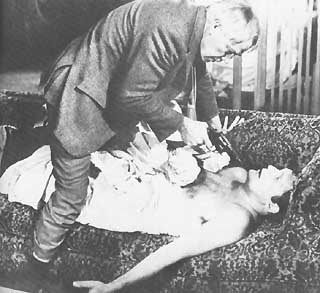Point Blank
D: John Boorman (1967); with Lee Marvin, Angie Dickinson, John Vernon, Carroll O'Connor, Keenan Wynn, James B. Sikking, Lloyd Bochner, Sharon Acker. During a heist at the old Alcatraz penitentiary, Walker (Marvin) is double-crossed by his partner Mal Reese (Vernon). Reese shoots Walker in a cell and leaves him for dead, making off with Walker's $93,000 cut of the loot. Adding insult to injury, Reese makes off with Walker's girlfriend Lynne (Acker), until Walker returns to exact revenge. Boorman's film takes a simple premise (from a novel by Donald Westlake under the name Richard Stark) and turns it into a movie that is both lyrical and aggressive, raw, and occasionally surreal. The story takes the conventions of the crime film/revenge movie and moves them into the Sixties, with a cool, corporate look and feel. Crime films of the late Fifties and early Sixties often drew comparisons between organized crime and big business (i.e., Sam Fuller's
Underworld, U.S.A.).
Point Blank takes that notion to its Sixties conclusion, in a fluorescent-lit world in which criminals wear gray suits and have little personality. The one exception is über-boss Brewster (O'Connor) and his outgoing personality. When Walker pistol-whips Brewster's bodyguard, Brewster takes a scolding tone; "You're a very bad man, Walker, a very destructive man!" As Walker, Lee Marvin is pure, implacable momentum, a cipher, as expressive as a rock and as unstoppable as a locomotive. His performance is a masterpiece of minimalist acting; the action scenes are brutally explosive and brief, in contrast to the restraint of the rest of the movie. Boorman's direction has drawn analogies such as "a crime film directed by Godard or Bertolucci," which isn't too far off the mark. The frequent flashbacks, slow-motion, and technical flourishes are nearly hypnotic at times, especially in a scene that cuts from Walker striding purposefully down a corridor to scenes at Lynne's apartment. The edits follow a very deliberate rhythm that is paced to the sound of Walker's footsteps reverberating down the hallway. The emotional detachment of the movie leads up to an ambiguous ending that puts the whole premise of the film in question.
Point Blank is a thoroughly Sixties-modern exercise in style that breaks with tradition and makes classic noirs such as
The Big Heat or
The Killing seem as dated as a buggy whip. Incidentally,
Point Blank was also the screen debut of familiar TV and movie heavy John Vernon.

